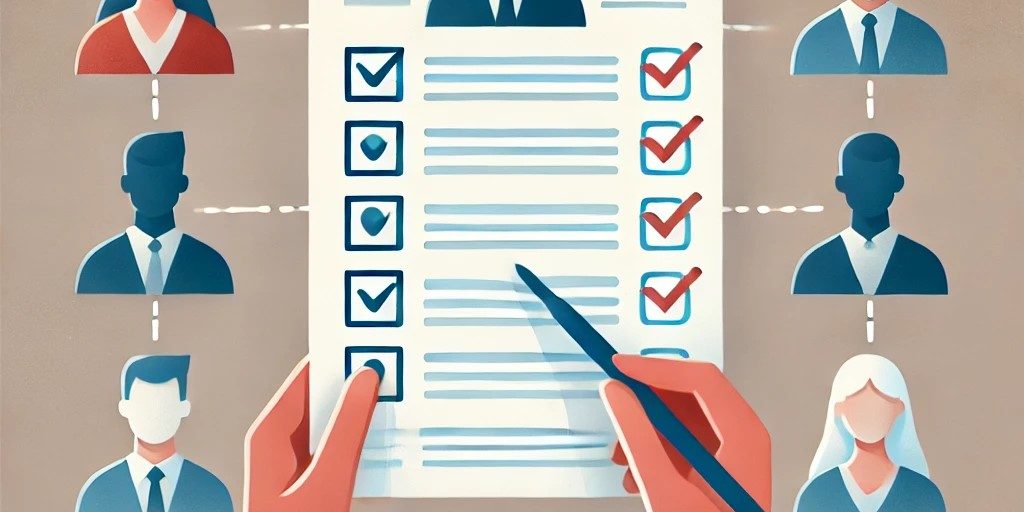Inclusive interview questions are the key to fair and effective hiring. They move beyond biased assumptions and “gut feelings” to uncover a candidate’s true skills, experience, and potential. By asking the right questions, you create a level playing field for all candidates and build a diverse, high-performing team. Let’s dig in!
Behavioural questions focused on skills & experience:
Behavioural questions are powerful tools for assessing past performance, a strong predictor of future success. The key to making them inclusive is to focus on skills and experiences relevant to the job, not on personal background or potentially biased topics.
Problem-solving & initiative
- “Describe a time you faced a complex problem with limited information. How did you approach gathering the necessary details and developing a solution?”
- “Tell me about a situation where you had to think outside the box to overcome an obstacle. What was your innovative solution?”
- “Share an example of a time you took initiative to improve a process or situation at work, even when it wasn’t explicitly your responsibility.”
Teamwork & collaboration
- “Describe a project where you had to work collaboratively with a diverse team to achieve a goal. What role did you play, and how did you ensure effective team communication and collaboration?”
- “Tell me about a time you had to work with someone who had a very different working style from your own. How did you adapt to work effectively together?”
- “Give me an example of a time you had to mediate a conflict within a team. What steps did you take to resolve the situation and build consensus?”
Communication & interpersonal skills
- “Describe a situation where you had to communicate a complex or sensitive message to someone. How did you ensure your message was understood and well-received?”
- “Tell me about a time you had to persuade someone to see your point of view, even when they initially disagreed. What was your approach?”
- “Share an example of a time you had to adapt your communication style to effectively interact with someone from a different cultural background or communication preference.”
Adaptability & resilience
- “Describe a time you faced a significant setback or failure in a project or at work. How did you handle the situation, and what did you learn from it?”
- “Tell me about a time you had to adapt quickly to a sudden change in priorities or a new work environment. How did you manage this transition?”
- “Give me an example of a time you had to work under pressure or with tight deadlines. How did you manage your time and stress to deliver results?”
Leadership & influence (even without formal authority)
- “Describe a time you had to influence a team or group of people to adopt a new idea or approach, even when you weren’t in a position of authority.”
- “Tell me about a situation where you motivated others to achieve a challenging goal. What leadership skills did you utilize?”
- “Share an example of a time you had to delegate tasks effectively to achieve a team objective. How did you ensure clear expectations and provide support?”
Learning agility & growth mindset
- “Describe a time you had to learn a completely new skill or technology for a project or role. What was your learning process?”
- “Tell me about a time you received constructive criticism that helped you improve your performance. How did you react to the feedback and implement the changes?”
- “Share an example of a time you actively sought out opportunities to expand your knowledge or skills in your field. What steps did you take?”
Situational questions focused on diverse & inclusive scenarios:
Situational questions present hypothetical workplace scenarios, allowing you to assess how candidates might behave in future situations. Focusing on diverse and inclusive scenarios helps gauge their awareness and skills in navigating diverse workplace dynamics.
Diverse team collaboration
- “Imagine you are leading a team project with members from diverse cultural backgrounds, communication styles, and levels of experience. How would you ensure effective communication, collaboration, and that everyone feels valued and included?”
- “Suppose a conflict arises within a diverse team due to differing perspectives or communication styles. Describe the steps you would take to mediate the conflict and facilitate a resolution that respects all viewpoints.”
- “You notice that some team members from underrepresented backgrounds are consistently being talked over or their ideas are being dismissed in team meetings. How would you address this situation as a team leader or a team member?”
Handling bias & promoting equity
- “Imagine you observe a colleague making a statement that you believe is unintentionally biased or insensitive in a team meeting. How would you respond to this situation in a professional and constructive manner?”
- “Suppose you are part of a hiring panel, and you notice that one interviewer seems to be consistently favouring candidates who are very similar to themselves. How would you raise this concern to ensure a fair and unbiased hiring process?”
- “You are assigned to lead a project aimed at reaching a new, diverse customer segment. What steps would you take to ensure your project team understands the needs and perspectives of this new audience and develops inclusive solutions?”
Adaptability to diverse clients/customers
- “Imagine you are working with a client or customer from a very different cultural background or communication style than your own. How would you adapt your communication and service approach to build rapport and ensure a positive working relationship?”
- “Suppose a client expresses a need or preference that is based on their cultural background or beliefs, which might be different from your usual practices. How would you balance meeting their needs while also adhering to company policies and ethical guidelines?”
- “You are responsible for creating marketing materials for a diverse global audience. What considerations would you take into account to ensure the materials are culturally sensitive, inclusive, and resonate effectively with a wide range of people?”
Accessibility & accommodation
- “Imagine a new team member joins your team who has a visible disability and requires certain workplace accommodations to perform their role effectively. How would you and your team ensure they are welcomed, supported, and have the resources they need to succeed?”
- “Suppose a candidate you are interviewing requests a specific accommodation for the interview process due to a disability. How would you handle this request to ensure a fair and inclusive interview experience?”
- “You are designing a training program for a diverse workforce with varying learning styles and accessibility needs. How would you ensure the training is engaging, effective, and accessible to all participants?”
Questions to assess values alignment with diversity & inclusion:
These questions directly explore a candidate’s values, beliefs, and understanding of DEI principles. They help assess their genuine commitment to inclusion and equity.
Personal understanding & commitment
- “What does diversity and inclusion mean to you personally, and why do you believe it is important in the workplace?”
- “Describe your understanding of equity vs. equality. Why is an equitable approach important in creating a fair workplace?”
- “What are some of the benefits you see in working in a diverse and inclusive environment?”
- “How do you personally contribute to creating an inclusive and welcoming environment in your workplace or team?”
Awareness & continuous learning
- “Tell me about a time you recognized a lack of diversity or inclusion in a team or situation. What steps, if any, did you take to address it?”
- “How do you stay informed about current issues and best practices related to diversity, equity, and inclusion?”
- “Describe any experiences you’ve had in actively promoting or advocating for diversity and inclusion in a professional or personal setting.”
- “What are some of the challenges you anticipate might arise when working in a diverse team, and how would you proactively address them?”
Self-reflection & growth
- “Describe a time you realized you had made an assumption or held a bias about someone from a different background. What did you learn from that experience, and how did it change your perspective?”
- “What steps do you take to ensure you are being inclusive in your communication and interactions with people from different backgrounds?”
- “How do you typically react to feedback, especially if it’s about your behaviour or communication style and its impact on others from different backgrounds?”
- “In what ways are you actively working to grow your own cultural competence and understanding of diverse perspectives?”
Questions to AVOID (and Why):
It’s equally important to be aware of question types that are problematic and can undermine your DEI efforts. These questions are often biased, irrelevant, or even illegal.
- Illegal or discriminatory questions:
- Anything about: age, marital status, family plans, religion, sexual orientation, gender identity, disability status, race/ethnicity, origin, socioeconomic background.
- Why avoid: these are illegal in many regions and create a hostile and discriminatory interview environment. They are irrelevant to job performance and reinforce systemic biases.
- “Culture fit” questions (used subjectively):
- Examples (often problematic): “Do you think you’d ‘fit in’ here?” “Describe our company culture in your own words.” “We’re a ‘work hard, play hard’ company, does that resonate with you?”
- Why avoid: “culture fit” is often a poorly defined and subjective concept that can easily mask affinity bias (hiring people who are similar to the interviewer). It can perpetuate homogeneity and hinder diversity. Focus on skills and values alignment, not “fit.”
- Stereotyping or assumption-based questions:
- Example: “As a [gender/race/etc.], what are your strengths in this role?”
- Why avoid: reinforces harmful stereotypes and makes unfair assumptions about individuals based on group affiliation.
Do’s and don’ts for asking inclusive interview questions:
- Do:
- Prepare structured question sets in advance: plan your questions carefully, ensuring they are behaviour-based, situational, or values-focused and directly relevant to the job competencies.
- Train interviewers thoroughly: provide comprehensive training on unconscious bias, inclusive interviewing techniques, and legal compliance.
- Focus on skills, experience, and potential: frame questions to assess these core areas, not personal attributes or background.
- Use consistent questions for all candidates for the same role: standardization is key to fairness and comparability.
- Create a welcoming and respectful interview environment: make candidates feel comfortable and valued, regardless of their background.
- Don’t:
- Ask illegal, discriminatory, or irrelevant questions: be vigilant about avoiding prohibited topics.
- Rely on “gut feeling” or subjective impressions: base evaluations on evidence from structured questions and scoring rubrics.
- Use “culture fit” as a primary evaluation criterion: focus on skills, values alignment, and contribution to team diversity instead.
- Ask questions that reinforce stereotypes or make assumptions: be mindful of your language and avoid phrasing that could perpetuate bias.
- Make the interview too casual or personal: maintain professional boundaries and focus on job-related competencies.
Interviewing for inclusion to build a better team
Mastering inclusive interview questions is an ongoing journey of learning and refinement. By consciously choosing questions that focus on skills, experience, and values alignment, and by actively avoiding biased or irrelevant inquiries, you create a fairer, more effective hiring process. This commitment to inclusive interviewing is not just about compliance – it’s about unlocking the full potential of every candidate and building a truly exceptional and diverse team.





